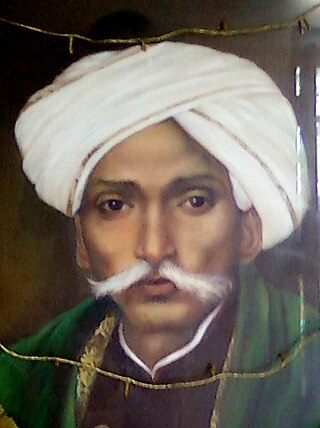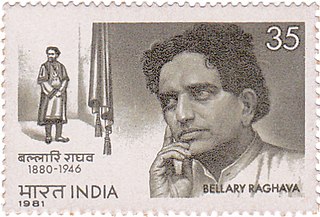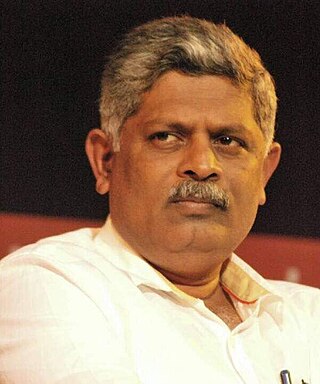
Ballari in the eponymous Ballari district, is a city in the state of Karnataka, India. Bellari houses many steel plants such as JSW Vijayanagar, one of the largest in Asia.

Gurajada Venkata Apparao was an Indian playwright, dramatist, poet, and writer known for his works in Telugu theatre. Rao wrote the play Kanyasulkam in 1892, which is considered as the greatest play in the Telugu language. One of the pioneers of Indian theatre, Apparao holds the titles Kavisekhara and Abyudaya Kavitha Pithamahudu. In 1910, Rao scripted the widely known Telugu patriotic song "Desamunu Preminchumanna".

Akkineni Laxmi Vara Prasada Rao, known professionally as L. V. Prasad, was an Indian film director, producer, actor, and businessman. He was one of the pioneers of Indian cinema and is the recipient of the Dadasaheb Phalke Award, the highest Award for films in India. In 1980, he was awarded the Raghupathi Venkaiah Award, for his contribution to Telugu cinema.

Arakalagudu Narasingarao Krishna Rao, popularly known as Anakru, was an Indian writer. He is one of the best-known writers in the Kannada-language and was popularly known as Kadambari Sarvabhouma. The inception of the Pragatishila ("progressive") movement in Kannada literature is credited to him. He received an honorary doctorate from the Mysore University and is also a recipient of the Karnataka Sahitya Academy Award.

N. N. Pillai was an Indian playwright, actor, theatre director, orator, screenplay writer, lyricist and an I.N.A Freedom fighter. : in INA – Indian National Army). He has been given the title “Nadakacharyan” of Malayalam Theatre. through his contributions to theater as a playwright, director, actor and a producer.

K.V. Akshara is a director, playwright and writer in the Kannada language. He is the son of the writer K.V. Subbanna. He is a prominent figure in contemporary Kannada theatre.

Telugu theatre is Indian theatre in the Telugu language, based in the states of Andhra Pradesh and Telangana. Gurajada Apparao wrote the play, Kanyasulkam in 1892, which is often considered the greatest play in the Telugu language. C. Pullaiah is cited as the father of Telugu theatre movement.

Chandrashekhara Basavanneppa Kambara is a prominent Indian poet, playwright, folklorist, film director in Kannada language and the founder-vice-chancellor of Kannada University in Hampi also president of the Sahitya Akademi, country's premier literary institution, after Vinayak Krishna Gokak (1983) and U.R. Ananthamurthy (1993). He is known for effective adaptation of the North Karnataka dialect of the Kannada language in his plays, and poems, in a similar style as in the works of D.R. Bendre.
Gunturu Seshendra Sarma B.A. B.L., also known as Yuga Kavi, was a Telugu poet, critic and litterateur. He is well known for his works Naa Desam, Naa Prajalu and Kaala Rekha. He authored over fifty works which have been translated into English, Kannada, Urdu, Bengali, Hindi, Nepali and Greek.

Mysore literature in Kannada is a body of literature composed in the Kannada language in the historical Kingdom of Mysore in Southern India and written in the Kannada script. The writings date from the Kingdom of Mysore, which existed from around 1600 CE until the establishment of modern India in 1947. Many of the works of this literature written on religious themes are labeled Veerashaiva or Vaishnava in acknowledgment of the two faiths that gave form to the literature and fostered it until the advent of the modern era. Despite a gradual decline in the popularity of Jainism, authors devoted to the faith produced some works of merit. Secular themes dealing with a wide range of subjects were also written on. Kannada literature flourished for a short while in the court of the neighbouring kingdom of the Nayakas of Keladi whose territory was annexed by Mysore in 1763.
Dharmavaram Ramakrishnamacharyulu was a Telugu dramatist and playwright from Bellary. He was known as "Andhra Nataka Pithamaha" and wrote more than 30 original plays.

Janaki Srinivasa Murthy popularly known by her penname Vaidehi was born on 12 February 1945. She is an Indian feminist writer and well-known writer of modern Kannada language fiction. Vaidehi is one of the most successful women writers in the language and a recipient of prestigious national and state-level literary awards. She has won the Sahitya Akademi Award for her collection of short stories, Krauncha Pakshigalu in 2009.

Bellary Raghava ; born Tadipatri Raghavacharyulu; 2 August 1880 – 16 April 1946) was an Indian playwright and actor, known for his works predominantly in Telugu theatre and cinema. His uncle Dharmavaram Ramakrishnamacharyulu was a pioneering dramatist in Telugu, and initiated him on the stage. Raghava was also associated with another dramatist from Ballari, Kolachalam Srinivasa Rao. His students include female artists like Sarojini Kopparapu, Padmavati Kommuri, Annapurna Kakinada, and male artists like Vasudevarao K.S., Apparao Basavaraju and Banda Kanakalingeswara Rao.
Nataraja Ramakrishna was an Indian dance guru. He was the chairman of Andhra Pradesh Sangeeta Nataka Academy. He was also a scholar and musicologist who promoted classical dance in Andhra Pradesh and worldwide.

Rattihalli Nagendra Rao was an Indian theatre actor, film actor and director in South Indian cinema. Following his career in theatre, Rao turned to film a where he became an actor, director, producer, screenwriter and occasional composer. He is considered one of the most influential personalities in the history of South Indian cinema.

Kuppur Yalappa Narayanaswamy, also known as KYN, is a popular Kannada poet, scholar, critic, and playwright. He is currently a Kannada professor in the Maharani Cluster University, Bangalore. He is the author of many popular Kannada plays including Kalavu, Anabhigna Shakuntala, Chakraratna, Huliseere, and Vinura Vema. He has also translated Kuvempu's Shudra Tapaswi into Telugu. He is credited with adapting Kuvempu's magnum opus Malegalalli madumagalu into a 9-hour play. He has also written the screenplay for the films Kalavu and Suryakaanti.
Kokkonda Venkata Ratnam Pantulu (1842–1915) was a well-known Telugu and Sanskrit writer in the nineteenth century. As a respect word pantulu meaning scholar was added. He was known as Andhra Johnson and is remembered as the multifaceted Andhra genius, the pioneer of many movements in social reform, literature, publication, journalism.
Nadella Purushottama Kavi was an Indian scholar, playwright, teacher and editor. Purushottama Kavi is notable for his "Chitra Kavyas". He was a great scholar in Sanskrit, Telugu, Persian and Hindi and composed more than 100 works in Telugu and Hindi. He also authored several plays in Hindi for the Hindu Nataka Samajam.
Lankappa Hanumanthaiah is an Indian poet, politician of the Indian National Congress and a member of the upper house of the Indian Parliament, the Rajya Sabha, from the state of Karnataka.
Kolachalam Venkata Rao was a freedom fighter and social reformer of Madras Presidency. He represented the state of Karnataka in the first session of the Indian National Congress. He was one of the early social reformers who encouraged widow remarriages and female education. He was the elder brother of Kolachalam Srinivasa Rao.













